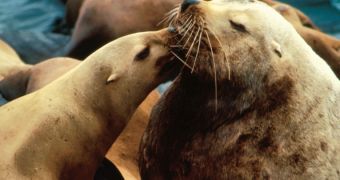Officials at the US National Oceanic and Atmospheric Administration (NOAA) Fisheries Service announced recently that they plan to make modifications to the status of several areas in Alaska. The measures are necessary so that the organization complies with the Endangered Species Act. Scientists and conservations experts say that the fate of Steller sea lions, as a species, is at stake here, and add that more needs to be done in order to ensure that the animals don't go extinct. The situation is worst off the western coasts of the Aleutian Islands, where populations have almost died out entirely.
According to the regional administrator for NOAA Fisheries’ Alaska region, Jim Balsiger, ensuring that the sea lions have access to enough fish supplies is essential for the animals' survival. In the conclusions section of the draft 2010 Groundfish Biological Opinion, released by the Alaska region group, the expert writes that commercial fishing boats searching for groundfish at several locations are depleting the natural food sources sea lions rely upon for survival. The document states that steps need to be taken to modify the status of those waters, so as to prevent excessive fishing.
The Bering Sea, the Aleutian Islands and the Gulf of Alaska should all be targeted by the new decision. “Even though factors beyond our control affect the sea lion population, under the Endangered Species Act we are required to ensure that the actions our agency takes to allow fisheries do not jeopardize these endangered animals,” Balsiger says. Statistics show that no less than 4 billion pounds of fish are being harvested from these water annually, which means that the sea lions' food supply is being seriously hampered with, and in an unsustainable manner too.
“NOAA’s Fisheries Service will work with the council to develop management measures for the groundfish fisheries to ensure fishing operations are consistent with the mandates of the ESA. The ultimate goal is the recovery of the western Steller sea lion population so that the species can be removed from the list of endangered and threatened wildlife,” says Balsiger.
“NOAA Fisheries intends to complete the final Biological Opinion and to implement the direct final rule measures before the start of the 2011 fishery in January. After the final biological opinion is adopted, NOAA Fisheries will submit the science to the Center for Independent Experts (CIE) for peer review. NOAA Fisheries is also committed to cooperate and work with the Council or other groups on further scientific peer reviews as long as any resulting peer review does not require funding from NOAA Fisheries,” NOAA officials say in a press release.

 14 DAY TRIAL //
14 DAY TRIAL //